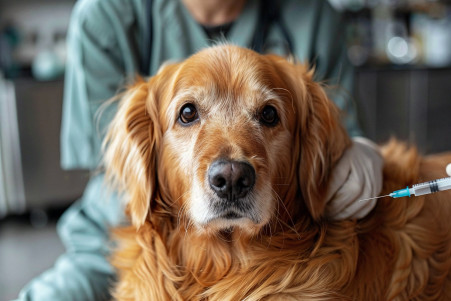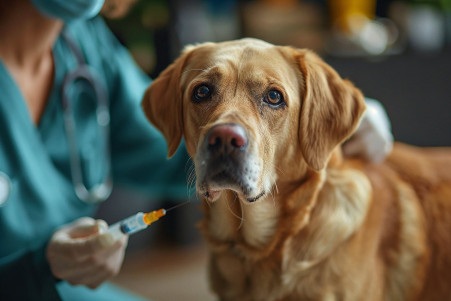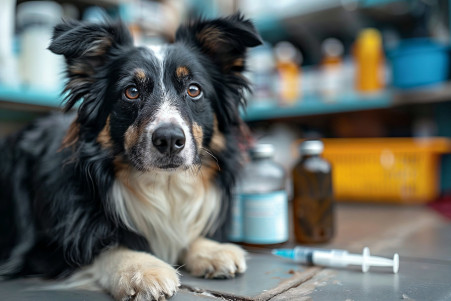Leptospirosis Vaccine Side Effects in Dogs: Understanding the Risks
25 May 2024 • Updated 25 May 2024

If you're a dog owner, you want to be as informed as possible about the potential side effects of the leptospirosis vaccine for dogs, so that you can make the best decision for your pet. The leptospirosis vaccine can cause mild and temporary side effects in dogs like fever, lethargy, loss of appetite, and pain or swelling at the injection site. Rare but more serious reactions like allergic responses, respiratory issues, and autoimmune disorders have also been documented.
While these side effects are important to note, it's also true that leptospirosis is a bacterial disease that can be fatal and is zoonotic, meaning it can be transmitted from animals to humans. To help you better understand the risks and benefits, we will look at the most recent veterinary research on the vaccine's efficacy and safety data. This will help you understand why some dogs may experience side effects, what the risk factors are, and how to prevent and monitor for side effects in dogs that have been vaccinated. Armed with this knowledge, you can talk to your vet about your dog's unique situation.
Can the leptospirosis vaccine cause side effects in dogs?
How to Tell If Your Dog Has Leptospirosis
Leptospirosis can cause a variety of symptoms in dogs, ranging from mild to severe and even life-threatening, according to research cited by the American Veterinary Medical Association. These symptoms include fever, depression, loss of appetite, vomiting, diarrhea, abdominal pain, severe weakness, dehydration, jaundice, and weight loss. If the infection is not treated, it can lead to kidney and liver failure, lung disease, bleeding disorders, and fluid accumulation, according to Cornell University's College of Veterinary Medicine.
Unfortunately, many of these symptoms are common to other diseases, which can make diagnosing leptospirosis difficult. According to the Merck Veterinary Manual, a diagnosis of leptospirosis is often made based on a combination of clinical signs and specific tests, such as PCR, antibody testing, and imaging. That's why it's important to seek veterinary care as soon as possible if your dog is showing any of these symptoms. As Today's Veterinary Practice points out, leptospirosis can progress quickly and be fatal if it's not treated.
Leptospirosis Vaccine for Dogs: Side Effects
Although the leptospirosis vaccine is considered safe, it can cause mild and short-term side effects in some dogs, according to Pumpkin. These side effects include fever, lethargy, loss of appetite, and pain or swelling at the injection site. More severe side effects, including allergic reactions, respiratory problems, and autoimmune diseases, have also been reported, according to Bond Vet.
In fact, a study published in PubMed found that the incidence rate for owner-reported adverse events following vaccination of dogs that received a Leptospira vaccine was significantly higher compared to dogs that did not. However, the researchers noted that hypersensitivity reactions were rare overall.
As VCA Animal Hospitals points out, it's important to talk to a vet about potential side effects and to watch dogs that have been vaccinated for any adverse reactions. This will ensure that the benefits of being vaccinated against leptospirosis outweigh the risks for each dog.
Leptospirosis Vaccine Schedule and Booster Shots for Dogs
Puppies should receive two doses of the leptospirosis vaccine initially, with the second dose administered 2-4 weeks after the first, according to the American Animal Hospital Association’s vaccination guidelines. After the initial two-dose series, dogs that are at risk of exposure should receive a single annual booster dose, according to Daily Paws.
That said, the AAHA guidelines explain that dogs at high risk of exposure may need more frequent revaccination, including every 6-9 months, depending on their specific situations. It’s important to stick to the recommended schedule to ensure the vaccine’s effectiveness and help prevent potential side effects, according to Vetstreet.
Veterinarian input is essential for determining the right vaccination schedule for each dog, based on their age, breed, and other risk factors, according to Today's Veterinary Practice. This will help make sure that your dog gets the most protection possible from the leptospirosis vaccine.
Effectiveness and Protection Offered by the Leptospirosis Vaccine
A systematic review and meta-analysis published in PubMed showed that the currently available commercial leptospirosis vaccines can offer 84% protection against clinical disease and 88% protection against renal carrier status in dogs. The study also demonstrated that vaccinated dogs were at a much lower risk of clinical disease and renal carrier status than unvaccinated control dogs.
That said, the Saratoga Veterinary Hospital points out that while the leptospirosis vaccine can reduce the likelihood of a dog contracting the disease and reduce the severity of the symptoms if they do get sick, it does not offer 100% protection. This is because, as the INVMA notes, the current vaccines only protect against a few of the many Leptospira serovars, which means that breakthrough infections can still happen.
Moreover, studies cited by Merck Animal Health show that vaccine-induced immunity is generally effective for at least a year, but it can decline over time, which is why annual booster shots are often recommended. As the systematic review also observes, the duration of antibody titers isn't always a reliable indicator of how well a vaccine will work.
Because of these limitations, the Leptospirosis vaccination in dogs study stresses that vaccination should be used in combination with other preventive strategies, like staying away from areas with wildlife and water. In the end, as the Saratoga Veterinary Hospital recommends, you should discuss the pros and cons of the leptospirosis vaccine with your vet and take into account your dog's specific needs before making a decision.
Other Things to Consider
When deciding whether or not to vaccinate your dog against leptospirosis, there are a number of other factors to consider, including your dog's age, breed, lifestyle, and where you live, according to Bond Vet. For example, a study published in the PMC found that older dogs and certain breeds, including French Bulldogs, Staffordshire Bull Terriers, and Pugs, were at a higher risk for adverse vaccine reactions.
Meanwhile, dogs who live in areas with a higher prevalence of leptospirosis and those who spend a lot of time around wildlife and standing water are more likely to benefit from the vaccine, according to VCA Animal Hospitals. Your dog's overall health is also an important factor to consider, and it's important to talk to your vet to determine the risk-benefit ratio for your dog, according to Vetstreet.
While there may be times when it's best to skip certain vaccines, Bond Vet warns that doing so doesn't mean you're no longer at risk for the disease and that you should still take other preventive measures. However, by taking all of these factors into account and working with your vet, you can make the best decision for your dog.
Conclusion: How to Decide What's Best for Your Dog
Leptospirosis is a potentially deadly bacterial disease that can also be transmitted to humans. While the vaccine can be effective in protecting dogs from the disease, it's important to understand the potential side effects and make an informed decision based on your dog's individual needs.
While the vaccine has been shown to be effective in protecting dogs from leptospirosis, it has also been linked to mild side effects such as fever, lethargy, and pain at the injection site, as well as more serious side effects, although these are rare. In general, however, the risk of side effects has gone down as the vaccine has been updated. It's important to work with a veterinarian to determine the right vaccination schedule and to monitor for side effects.
Leptospirosis can cause a wide range of symptoms, from mild to severe. It's important to get your dog to a vet as soon as possible if you suspect they have leptospirosis, as the disease can progress quickly and lead to organ failure. In many cases, a diagnosis will require specific tests.
Ultimately, whether or not to vaccinate a dog against leptospirosis will depend on a number of factors, including the dog's age, breed, lifestyle, and location. It's important to work with a veterinarian to weigh the risks and benefits and make an informed decision that's best for your dog.


